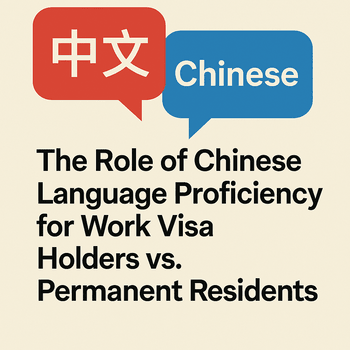
Chinese language proficiency is more than a mere skill—it is a powerful tool that can transform everyday challenges into opportunities for professional and personal growth.
In China’s fast-evolving economic and cultural landscape, both work visa holders and permanent residents depend on their grasp of Mandarin to navigate business communication, government processes, and community interactions.
In this post, we explore the nuances of Chinese language proficiency for these two groups, outlining their respective challenges, benefits, and strategies to achieve linguistic success.
This discussion will include comparative tables, useful external resources, and actionable insights to help every reader understand the importance of mastering Mandarin in China.
The Growing Importance of Mandarin in a Global Economy
In today’s global marketplace, language serves as the bridge connecting diverse cultures, professional environments, and everyday life.
For foreign professionals in China, Mandarin isn’t just about communicating—it’s about integrating into a society where the language influences every facet of life, from business negotiations to community events.
For work visa holders, the focus is often on fulfilling specific job responsibilities.
While many multinational companies may use English as the primary working language, having even an intermediate knowledge of Mandarin can significantly reduce misunderstandings and pave the way for deeper relationships with local colleagues and clients.
In contrast, permanent residents, who intend to settle and build a long-term life in China, find that advanced language skills are integral to daily interactions, accessing government services, and fully immersing themselves in local culture.
Work Visa Holders: Balancing Expertise with Language Adaptation
Work visa holders are usually brought in for their niche skills and professional expertise.
In many cases, employers might not initially require top-level Mandarin fluency, especially in specialized or technical roles.
However, as these professionals begin to interact with a broader array of colleagues and clients, the benefits of increased language proficiency become evident.
Why Proficiency Matters for Work Visa Holders:
- Workplace Efficiency: Many tasks—such as reading technical documents, following safety protocols, or brainstorming with local teams—can be performed with intermediate language skills. Yet, even modest improvements in Mandarin can lead to fewer errors and smoother project outcomes.
- Networking and Trust: Chinese business culture places a premium on relationship-building. Proficiency in Mandarin can signal respect for local customs and foster stronger professional ties.
- Everyday Navigation: From interacting with local vendors to understanding workplace notices and memos, a better command of the language enhances daily efficiency and reduces reliance on translation services.
Below is a table summarizing key aspects of language proficiency for work visa holders:
| Aspect | Work Visa Holders |
|---|---|
| Workplace Communication | Ranges from basic to intermediate; often supplemented by bilingual colleagues. |
| Administrative Tasks | Basic proficiency recommended; many rely on translation services for official procedures. |
| Networking Opportunities | Intermediate proficiency can significantly broaden the scope for establishing and strengthening professional relationships. |
| Cultural Adaptation | Even basic language skills can ease minor cultural misunderstandings, though deeper integration may require additional effort. |
| Language Testing | In most cases, there is no formal language test required for work visas, but companies may encourage or offer training courses to boost proficiency. |
The trends and insights outlined above are supported by industry observations and official guidelines that emphasize efficient communication as key to operational success.
Permanent Residents: The Integral Role of Language in Long-Term Integration
For those holding permanent residency status in China, Mandarin is not just a professional tool; it is the essential key to unlocking full integration into society.
As permanent residents make China their long-term home, every interaction—from accessing public services to participating in local cultural events—requires a deeper mastery of the language.
Key Considerations for Permanent Residents:
- Government and Administrative Processes: Permanent residents frequently interact with the local bureaucracy—from registering for healthcare to managing everyday legal documents. High-level Mandarin proficiency helps ensure these processes are seamless.
- Social and Cultural Integration: Advanced language skills allow for richer participation in community life including neighborhood meetings, local festivals, and even simple social outings. This deep involvement not only fosters personal fulfillment but also enhances professional opportunities.
- Career Advantages: For permanent residents, a robust command of Mandarin can lead to promotions, increased responsibilities, and more meaningful contributions within organizations. Employers often value employees who have invested in language learning as it reflects long-term dedication to the organization and the country.
- Educational Opportunities: For families, parents with a good handle on the language are better equipped to assist their children with schooling, ensuring smoother assimilation into the education system.
The table below provides a comparative view of language expectations for permanent residents:
| Aspect | Permanent Residents |
|---|---|
| Workplace Communication | Expected to possess advanced skills for diverse and in-depth interactions, contributing meaningfully in discussions and decision-making. |
| Administrative Efficiency | High proficiency is often mandatory to navigate official channels—be it for healthcare, taxation, or legal matters. |
| Networking & Community | Proficient language skills empower long-term residents to cultivate extensive personal and professional networks within local communities. |
| Cultural Immersion | A greater command of Mandarin is directly correlated with deeper cultural understanding, leading to richer personal experiences in day-to-day life. |
| Language Testing Requirements | In certain cases, language proficiency may be evaluated as part of the naturalization process or when accessing specific governmental benefits. |
For permanent residents, the pathway to integration is inseparable from learning the language, as it broadens every aspect of living in China—from professional achievement to full-fledged community participation.
The Impact on Career Growth and Social Integration
Chinese language proficiency serves as a catalyst for career advancement in China.
For work visa holders, the ability to communicate effectively on the job can mean fewer misunderstandings, enhanced collaboration with local colleagues, and direct access to a wider network of clients and advisors.
In client-facing roles, for example, being able to converse in Mandarin can elevate one’s professional image and lead to long-term business relationships.
For permanent residents, Mandarin fluency paves the way for leadership roles and opens up opportunities management may otherwise reserve for native speakers who understand the subtleties of local language and culture.
Beyond the corporate world, strong Mandarin skills enhance the ability to navigate government offices, partake in community affairs, and build lasting interpersonal relationships.
Both groups benefit significantly from the strategic use of language training programs and cultural immersion practices, which can drive innovation, reduce errors in communication, and foster mutual understanding—a key factor for personal and professional success in a global economy.
Strategies to Enhance Chinese Language Proficiency
Regardless of whether you are a work visa holder or a permanent resident, improving your Mandarin is an ongoing process.
Here are some effective strategies:
- Formal Education:
Enroll in language courses at local institutions or online platforms such as Coursera or edX. These courses are structured to build proficiency systematically and are often tailored to different proficiency levels. - Immersive Practices:
Engage with local communities through language exchange events, cultural clubs, or informal gatherings. Interacting daily with native speakers can accelerate your learning curve dramatically. - Digital Tools:
Apps like Duolingo, Pleco, and HelloChinese offer interactive lessons, vocabulary drills, and pronunciation guides that fit into the busy schedules of professionals and residents alike. - Practical Use:
Include Mandarin in your daily routine—read local newspapers, watch Chinese television, or even listen to Mandarin podcasts. These small steps reinforce language skills in everyday contexts.
A quick resource table to guide your journey:
| Resource | Description | Link |
|---|---|---|
| Duolingo | Offers bite-sized lessons with gamified learning experiences. | Duolingo |
| Pleco | A comprehensive dictionary and study tool highly regarded among learners. | Pleco |
| HelloChinese | Tailored for non-native speakers with interactive lessons and practice. | HelloChinese |
| Coursera | Features courses from top universities to boost Mandarin fluency. | Coursera |
Adopting a mix of these strategies can lead to marked improvements in communication skills, regardless of your current proficiency level.
Adapting to the Evolving Linguistic Landscape in China
As China solidifies its position as a hub of global business and cultural exchange, the linguistic landscape is continuously evolving.
For expatriates, the pressure to learn Mandarin has never been greater. Companies are increasingly providing language training programs for their international hires, and government policies are steadily promoting language proficiency as an essential asset for long-term integration.
Both work visa holders and permanent residents are encouraged to see language skills not as a barrier but as a bridge.
For short-term professionals, building a functional command of Mandarin can lead to greater job satisfaction and smoother business operations.
For long-term residents, investing in language skills ultimately yields richer personal lives and more profound professional networks.
Government guidelines, like those outlined in the Rules for the Administration of Employment of Foreigners in China, emphasize the importance of effective communication in fostering a well-integrated workforce.
Many corporate entities have recognized this need by incorporating language training into their employee development packages—a move that benefits both donors of expertise and recipients of nuanced local collaborations.
Conclusion
Chinese language proficiency is a dynamic asset that impacts multiple facets of life in China.
While work visa holders may prioritize language learning as a pathway to more effective workplace communication and smoother daily operations, permanent residents embrace Mandarin as a gateway to complete cultural integration and long-term success.
Whether you’re newly arrived or settling down permanently, investing in your Mandarin skills is an investment in your future in one of the world’s most dynamic and culturally rich countries.
As China continues to reshape economic and cultural paradigms, the ability to master Mandarin will remain a highly prized skill—one that not only empowers individuals professionally but also fosters deep, meaningful connections in everyday life.
Explore the recommended resources, take advantage of formal and immersive learning opportunities, and embrace the journey toward linguistic success in China.
For additional insights on migration, employment, and living in China, consider exploring resources like China Legal Experts and the People Managing People blog series.



